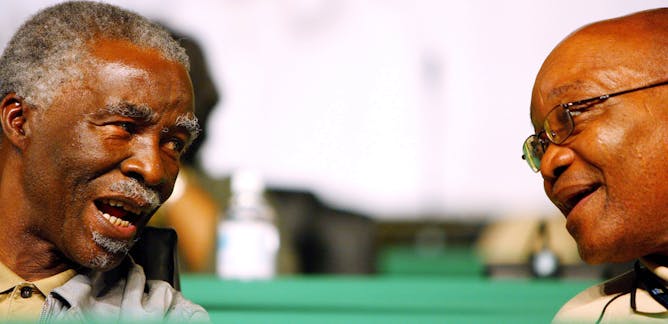
Articles on Podcast
Displaying 1 - 20 of 573 articles

The second episode of What happened to Nelson Mandela’s South Africa?, a three-part podcast series on The Conversation Weekly. Featuring interviews with Mashupye Maserumule and Michael Sachs.

Refugee programs in Canada have always been politicized, but more so in recent years, evidenced in discrepancies between programs for refugees from Gaza and Sudan and those from Ukraine.

A lot of good has happened since apartheid ended in 1994. Sadly, 30 years on, the country is in a political and economic crisis. Many are questioning the choices of the past three decades.

Beyoncé’s country-inspired album has caused a stir because the country music scene has a history of racial segregation that has erased its Black roots and gatekept it from Black artists.

For centuries, colonial powers have used starvation as a tool to control Indigenous populations and take over their land and wealth. A look back at two historic examples on two different continents.

Maxim Samson speaks to The Conversation Weekly podcast about the hidden lines that explain variations in everything from access to education to animal species

We speak with Hilal Elver, the former UN Special Rapporteur on the Right to Food and current University of California professor about the looming famine in Gaza after months of Israeli attacks.

Grace Augustine talks about her interviews with people who’ve chosen to leave their jobs over climate change concerns on The Conversation Weekly podcast.

It’s been nine years since #OscarsSoWhite called out a lack of diversity at the Oscars. Has anything changed? Prof. Naila Keleta-Mae and actress Mariah Inger unpack the progress.

The DCMR team has been busy prepping new episodes and next week, we start releasing episodes for season 7, taking our anti-racist lens to the news and issues occupying a lot of our minds these days.

Disinformation experts, Lilik Mardjianto and Nuurrianti Jalli, tell The Conversation Weekly podcast about the deepfakes circulating ahead of the Indonesian election.

Stephen Garnett takes us inside a scientific spat about how to govern the naming of new species. Listen to The Conversation Weekly podcast.

Call them pet peeves, call them petty grievances, one thing is certain – complaining about everyday irritations feels cathartic. It’s also the premise of American comedy podcast I’ve Had It.

Eviane Leidig talks about her research into women of the far right who have become online influencers. Listen to The Conversation Weekly podcast.

More Europeans are having to learn how to live alongside predators again. Listen to The Conversation Weekly podcast.

With food insecurity at an all-time high and food banks buckling under high demand as we head into this holiday season, experts say we need to focus on long-term solutions to tackle the issue at its root.

Both Israelis and Palestinians are accusing each other of genocide. In this episode of The Conversation Weekly podcast, we speak to a genocide expert on the legal definition of the term.

Subvertising campaigns are often funny, but they also aim to make a wider point about the unsustainable excesses of consumerism. Listen to The Conversation Weekly.

Modern settlers to Palestine viewed the desert as something they needed to “make bloom.” But it already was, thanks to the long history of Palestinian agricultural systems.

Calling all podcast listeners: Please take our survey about ‘Don’t Call Me Resilient.’
